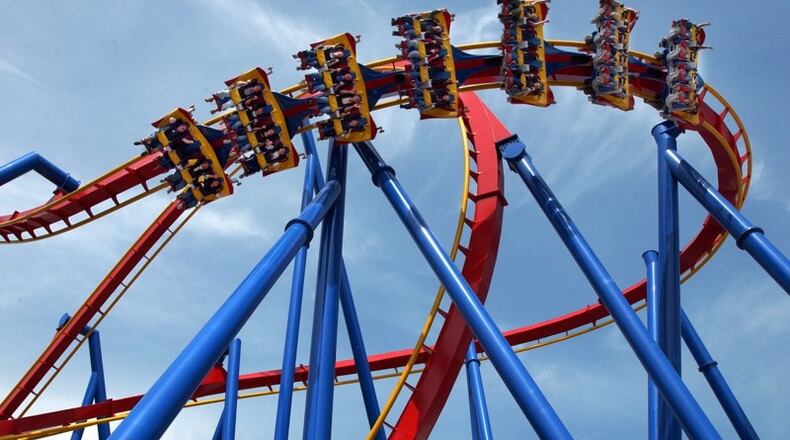A young man who was left with permanent brain damage after several men fell upon him at Six Flags may collect the $32.2 million judgment awarded him by a civil jury against the amusement park, the Georgia Supreme Court ruled unanimously on Monday.
In Martin v. Six Flags over Georgia, the high court reversed the state Court of Appeals, which had thrown out the jury award and ordered a new trial.
In a statement Monday, Six Flags said it does not comment on litigation.
Joshua Martin, 19, his brother and a friend had gone to Six Flags on July 3, 2007, to celebrate the friend’s admission to college. As they waited on a guard rail for a Cobb Community Transit bus after 9 p.m. that night, they noted the approach of a “ganglike” group of nearly 40 young men who were dressed similarly and talking about a fight, according to the court’s summary of the case.
The group included several seasonal employees of Six Flags, according to the court.
Martin and the two others left the guard rail as the mob approached, walking toward the CCT bus stop. They had actually stepped off Six Flags property when the group “began beating Martin with brass knuckles, knocked him to the ground and repeatedly stomped on him,” the court summary said. “The attack left Martin in a coma for seven days with severe and permanent brain damage.”
Credit: Georgia Department of Corrections
Credit: Georgia Department of Corrections
Both the Court of Appeals and the Supreme Court found that the park was liable. The disagreement was over an arcane point of law regarding the “apportionment” of the damages. That is, once the amount of damages is decided, the jury then calculates who must pay how much.
A Cobb County civil jury found in Martin’s favor in 2013, awarding him $35 million in damages. Of that sum, Six Flags was to pay $32.2 million, and the four men convicted of the assault were ordered to pay $2.8 million.
The Court of Appeals found that the damages were not properly apportioned because the jury did not have the names of two other men who also were implicated in the attack and should have had to share in paying damages. The appeals court threw out the damage award and ordered a new trial. Here the Supreme Court disagreed, saying a new trial of the entire case was not necessary. The damage award stands, it said, but It did order a new trial for the apportionment of the damage payments.
As to the central argument of the case — Six Flags’ claim that it wasn’t liable because the attack did not occur on its premises — Justice Grant was unsympathetic.
“Because the attack that caused Martin’s injuries began while both he and his assailants were on Six Flags property, Six Flags’ liability is not extinguished simply because Martin stepped outside the property’s boundaries while attempting to distance himself from his attackers,” Grant wrote. The evidence at trial showed that the attack did occur outside the boundaries of Six Flags’ property.
“But the evidence also reflects that Martin’s injuries were the culmination of a continuous string of events that were planned on Six Flags property, were executed at least in part on Six Flags property, and were the result of a failure by Six Flags to ‘exercise ordinary care to protect [its] invitee from unreasonable risks’ that Six Flags understood, and even tried to obscure from its patrons.”
Willie Gray Franklin Jr., Brad McGail Johnson, DeAndre Evans and Claude Morey III had already pleaded or been found guilty of aggravated assault and violating Georgia’s Gang Act in connection with the Martin beating. Each is on the hook for 2 percent of the $35 million awarded by the jury. Six Flags has to pay the rest.
In its statement Monday, Six Flags said, “We wish Mr. Martin and his family well.”
About the Author
The Latest
Featured



